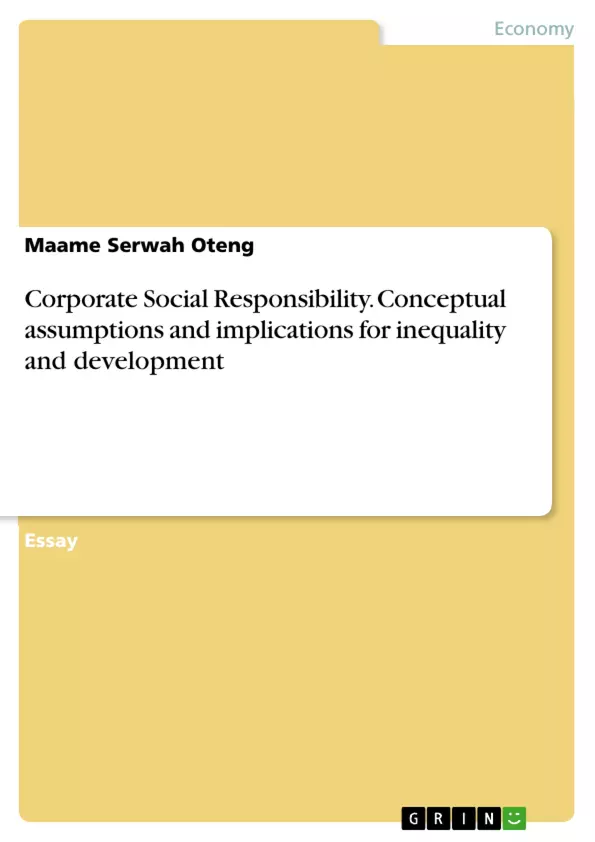This essay answers the following questions: What are the conceptual assumptions underlying Corporate Social Responsibility? What are the implications for inequality and development? Although Corporate Social Responsibility has brought many benefits and social responsibility to the environment and the society as a whole due to various reasons such as companies being able to apply the values of CSR to their action programs and commercial transactions for example, it also has a long and wide-ranging history. It is however mostly a product of the 20th century, notably from the early 1950s up to the present time. CSR went from focusing mainly on stakeholders to becoming more inclusive and having a global platform.
Inhaltsverzeichnis (Table of Contents)
- Corporate Social Responsibility: Conceptual Assumptions and Implications for Inequality and Development
- Defining Corporate Social Responsibility
- The Historical Background of Corporate Social Responsibility
- The Conceptual Assumptions of Corporate Social Responsibility
- Positive Conceptual Assumptions
- Negative Conceptual Assumptions
- The Implications of Corporate Social Responsibility for Inequality and Development
Zielsetzung und Themenschwerpunkte (Objectives and Key Themes)
This essay aims to explore the conceptual assumptions underlying corporate social responsibility (CSR) and analyze its implications for inequality and development. The essay will critically examine whether the positive aspects of CSR outweigh the potential downsides and explore the role of CSR in addressing global challenges like poverty and inequality.
- The historical evolution of CSR and its different forms.
- The conceptual assumptions of CSR, both positive and negative.
- The impact of CSR on inequality and development, particularly in developing countries.
- The role of multinational corporations in promoting sustainable development.
- The relationship between CSR, business ethics, and social progress.
Zusammenfassung der Kapitel (Chapter Summaries)
- The first chapter defines the term "corporate social responsibility" and traces its historical roots back to the Industrial Revolution. It examines early forms of CSR such as welfare schemes and the emergence of social problems associated with the factory system.
- The second chapter delves into the conceptual assumptions of CSR, analyzing both the positive and negative perspectives. It explores arguments supporting the claim that CSR can lead to clear business benefits and enhance corporate reputation. However, it also addresses criticisms of CSR as a form of self-flattery or a potential threat to free markets.
- The third chapter examines the implications of CSR for inequality and development. It analyzes the role of large corporations in addressing global challenges like poverty and inequality. The chapter explores both the potential benefits of CSR in promoting sustainable development and the potential limitations and unintended consequences.
Schlüsselwörter (Keywords)
The main keywords and focus topics of this text are: corporate social responsibility, inequality, development, business ethics, global citizenship, sustainable development, multinational corporations, stakeholder engagement, social impact, ethical business practices, and philanthropy.
Frequently Asked Questions
What are the conceptual assumptions of Corporate Social Responsibility (CSR)?
CSR assumes that companies have a duty to apply social and environmental values to their business transactions and action programs.
When did modern CSR emerge?
While it has roots in the Industrial Revolution, modern CSR is primarily a product of the 20th century, specifically from the early 1950s onwards.
How does CSR impact inequality and development?
CSR can help address global challenges like poverty, though critics argue it can also be used as a form of self-flattery or a threat to free markets.
What is the role of multinational corporations in sustainable development?
Large corporations use CSR to promote ethical business practices and engage with stakeholders globally to foster social progress.
What are the negative criticisms of CSR?
Some critics view CSR as unintended interference in market efficiency or as a superficial marketing tool rather than deep-seated ethical change.
- Quote paper
- Maame Serwah Oteng (Author), 2015, Corporate Social Responsibility. Conceptual assumptions and implications for inequality and development, Munich, GRIN Verlag, https://www.grin.com/document/1214544



